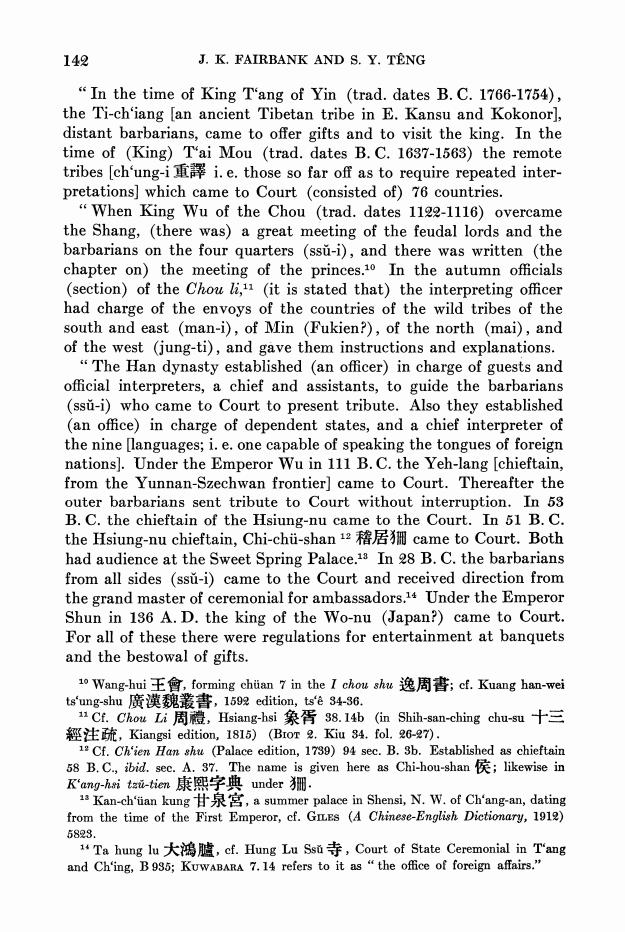正在加载图片...

142 J.K.FAIRBANK AND S.Y.TENG "In the time of King T'ang of Yin (trad.dates B.C.1766-1754), the Ti-ch'iang [an ancient Tibetan tribe in E.Kansu and Kokonor], distant barbarians,came to offer gifts and to visit the king.In the time of (King)Tai Mou (trad.dates B.C.1637-1563)the remote tribes [ch'ung-i i.e.those so far off as to require repeated inter- pretations]which came to Court (consisted of)76 countries. "When King Wu of the Chou (trad.dates 1122-1116)overcame the Shang,(there was)a great meeting of the feudal lords and the barbarians on the four quarters (ssu-i),and there was written (the chapter on)the meeting of the princes.10 In the autumn officials (section)of the Chou li,1(it is stated that)the interpreting officer had charge of the envoys of the countries of the wild tribes of the south and east (man-i),of Min (Fukien?),of the north (mai),and of the west (jung-ti),and gave them instructions and explanations. "The Han dynasty established (an officer)in charge of guests and official interpreters,a chief and assistants,to guide the barbarians (ssu-i)who came to Court to present tribute.Also they established (an office)in charge of dependent states,and a chief interpreter of the nine [languages;i.e.one capable of speaking the tongues of foreign nations].Under the Emperor Wu in 111 B.C.the Yeh-lang [chieftain, from the Yunnan-Szechwan frontier]came to Court.Thereafter the outer barbarians sent tribute to Court without interruption.In 53 B.C.the chieftain of the Hsiung-nu came to the Court.In 51 B.C. the Hsiung-nu chieftain,Chi-chui-shan 2 came to Court.Both had audience at the Sweet Spring Palace.13 In 28 B.C.the barbarians from all sides (ssu-i)came to the Court and received direction from the grand master of ceremonial for ambassadors.4 Under the Emperor Shun in 136 A.D.the king of the Wo-nu (Japan?)came to Court. For all of these there were regulations for entertainment at banquets and the bestowal of gifts. 1 Wang-hui王會,forming chuan7 in the I chou shu谗周普;cf.Kuang han-wei ts'ung-shu廣漢魏叢書,1592 edition,tse34-36. 11Cf.Chou Li周體,Hsiang-hsi象胥38.14h(in Shih-san-ching chu-su十三 經注疏,Kiangsi edition,18l5)(Bror是.Kiu34.fol.6-e7). 1 Cf.Ch'ien Han shu (Palace edition,1739)94 sec.B.3b.Established as chieftain 58 B.C.,ibid.sec.A.$7.The name is given here as Chi-hou-shan;likewise in Kang-hsi tau-tiem康熙字典under冊. aKan-ch'tian kung甘泉宫,a summer palace in Shensi,N.W.ofCh'ang-an,dating from the time of the First Emperor,cf.GIEs (A Chinese-English Dictionary,1912) 5823. 14 Ta hung lu大鴿臚,cf.Hung Lu Ssu寺,Court of State Ceremonial in T'ang and Ch'ing,B935;KUwABARA 7.14 refers to it as "the office of foreign affairs."142 J. K. FAIRBANK AND S. Y. TENG " In the time of King T'ang of Yin (trad. dates B. C. 1766-1754), the Ti-ch'iang [an ancient Tibetan tribe in E. Kansu and Kokonor], distant barbarians, came to offer gifts and to visit the king. In the time of (King) T'ai Mou (trad. dates B. C. 1637-1563) the remote tribes [ch'ung-i AN i. e. those so far off as to require repeated interpretations] which came to Court (consisted of) 76 countries. "When King Wu of the Chou (trad. dates 1122-1116) overcame the Shang, (there was) a great meeting of the feudal lords and the barbarians on the four quarters (ssii-i), and there was written (the chapter on) the meeting of the princes.10 In the autumn officials (section) of the Chou li,11 (it is stated that) the interpreting officer had charge of the envoys of the countries of the wild tribes of the south and east (man-i), of Min (Fukien?), of the north (mai), and of the west (jung-ti), and gave them instructions and explanations. "The Han dynasty established (an officer) in charge of guests and official interpreters, a chief and assistants, to guide the barbarians (ssi-i) who came to Court to present tribute. Also they established (an office) in charge of dependent states, and a chief interpreter of the nine [languages; i. e. one capable of speaking the tongues of foreign nations]. Under the Emperor Wu in 11 B. C. the Yeh-lang [chieftain, from the Yunnan-Szechwan frontier] came to Court. Thereafter the outer barbarians sent tribute to Court without interruption. In 53 B. C. the chieftain of the Hsiung-nu came to the Court. In 51 B. C. the Hsiung-nu chieftain, Chi-chui-shan 12 gIgs came to Court. Both had audience at the Sweet Spring Palace.13 In 28 B. C. the barbarians from all sides (ssui-i) came to the Court and received direction from the grand master of ceremonial for ambassadors.14 Under the Emperor Shun in 136 A. D. the king of the Wo-nu (Japan?) came to Court. For all of these there were regulations for entertainment at banquets and the bestowal of gifts. 10 Wang-hui d forming chian 7 in the I chou shu BAJA; cf. Kuang han-wei ts'ung-shuQkt&S, 1,592 edition, ts'" 34-36. 1 Cf. Chou Li AN Hsiang-hsi $,* 38.14b (in Shih-san-ching chu-su t~ VM6. , Kiangsi edition, 1815) (BIOT 2. Kiu 34. fol. 26-27). 12 Cf. Ch'ien Han shu (Palace edition, 1739) 94 sec. B. 3b. Established as chieftain 58 B. C., ibid. sec. A. 37. The name is given here as Chi-hou-shan R; likewise in K'ang-hsi tzit-tien A P. under INI. 13 Kan-ch'fian kung tW 2, a summer palace in Shensi, N. W. of Ch'ang-an, dating from the time of the First Emperor, cf. GILES (A Chinese-English Dictionary, 1912) 5823. 14 Ta hung lu ?kJJS, cf. Hung Lu Ssi i u, Court of State Ceremonial in T'ang and Ch'ing, B 935; KUWABARA 7. 14 refers to it as " the office of foreign affairs